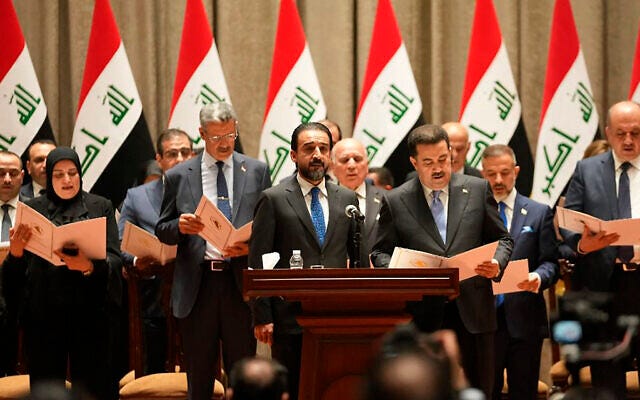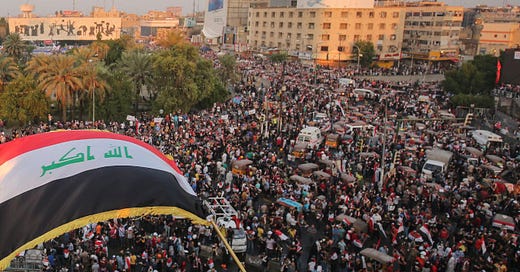How the Arrest of an Iraqi YouTuber is Inspiring a Free Speech Revolution
The jailing of Aboud Skeba epitomizes a theocratic version of cancel culture. Iraqis are tired of having their rights curtailed at the whims of religious zealots and are revolting against it.

Not many pleasant things have happened in Iraq since the US-led invasion in 2003. Still, the country’s positive progress can be summarized into three achievements: Free internet, free press, and less centralized markets.
Two out of three of these pillars are now under attack by the Iraqi government which has deep ties with the Islamic Republic regime in Iran, which controls a significant part of the country. The powers that be are working arduously to fool the West into believing they are open-minded and reasonable. While requesting aid from both the United States and France, they are simultaneously utilizing Iraqi institutions, particularly the central bank, to launder Iranian money and oil to the rest of the world.
Just like Iranians living under the Islamic Republic regime, most Iraqi citizens despise their government’s overreach, and the control exerted over their every move. In a tremendous investigative journalism story published in 2016, an anonymous Iraqi journalist revealed that the same group of people in the Iraqi government that wanted to ban alcohol were the same group that was at the helm of the black market. Although it may not appear obvious on the surface, the various freedoms that are given and taken away at a moment's notice by theocratic governments are all deeply interconnected.
A recent expose by well-known Iraqi comedian and commentator Ahmed Albasheer showed that something similar is happening right now regarding drugs across the country. The black market for drugs is one of the ways many militants, including those connected to the religious establishment, finance their activities and maintain power. To ensure their continued ability to control the citizenry, Iraq’s Iranian allied government recently passed new legislation regarding free expression and what they refer to as “content on the internet that damages public morale.” In other words, the government is once again engaging in forced mass censorship. The law is so vaguely written that it can affect anyone and everyone they deem a threat to their existence, and reduce the ability of people to find joy in things that the government doesn’t view as “moral.”
Let me be clear; this is the same government that has embezzled more than a billion dollars and is considered, rightly so, as one of the most corrupt regimes on the planet. The choices they make are telling and point to a blatant disregard for their citizenry’s best interests.
Unlike other Arab states of the Persian Gulf, like the UAE and Saudi Arabia, most Iraqis see little to none of the benefits from its oil production, despite the country being home to some of the most bountiful reserves in the world. So in terms of priorities, one might think that the government should focus on effectively capitalizing on its natural resources before targeting comedians that make fun of them or say things they don't like. Their priorities are disordered at best, and dangerous at worst.
For the sake of avoiding sensationalism, it’s worth noting that alcohol remains legal in some parts of Iraq. Night clubs and bars are still operational, but this could soon cease to be the case with the Iranian allied government in control. In many Islamic countries, consuming alcohol is banned in adherence to Islamic doctrine. This often comes in conjunction with other freedoms such as freedom of speech being curtailed, which leads to the deflation of public morale. According to Iraqi law, only religious minorities such as Christians and Yazidis have the authority to sell alcohol, but others can consume it if they wish. These arbitrary restrictions are designed to remind people of who is in control.

Soon after we heard about the legislation cracking down on free speech, a group of Iraqis (we are sometimes vaguely described as a “liberal coalition”) started a campaign both within parliament and among Iraqi citizens to try to stop this harmful and dangerous legislation from being upheld. Ahmed Albasheer launched a campaign to support Aboud Skeba, one of the comedians who was the latest victim of the reigning government’s feckless laws. When asked why he started the campaign, Albasheer said,
What motivated me to launch this campaign in support of Skeba in pursuir of his and his colleague’s release is the fact that Iraq is facing so many issues that need much more attention from the government than the story of a comedian that the government deems ‘immoral’ or ‘sexual.’ The words Skeba used were not explicit in any way. It is a slippery slope from controlling bloggers, social media influencers, and entertainment. I believe this is just the beginning of governmental efforts to interfere in people’s freedom of expression and advance their efforts to silence and scare everyone. It’s about control.
It looks like the telecommunication committee leaked an internal communication document containing activities that they deem offensive. This list includes but is not limited to; criticizing the government, criticizing religious and political figures, promoting human rights, and defending the LGBTQ community. All of this is a vicious attempt to silence people and control the type of content they are exposed to. They only want to allow content that actively serves the government’s agenda.
Aboud comes from an impoverished family and worked in construction prior to his wrongful arrest. In his spare time, the comedian recorded funny videos about his attempt to speak in English without knowing any vocabulary. Seems harmless, right? The Iranian regime, now infamously known for the killing of Mahsa Amini for not wearing her headscarf properly, doesn’t agree. They see it as a threat to their continued reign of terror. The Iraqi government arrested Aboud for the crime of making people laugh.
Aboud’s arrest engendered sympathy from many Iraqis. Albasheer’s campaign aims to buy Aboud a house. Since its launch, it has been getting support from many Iraqis living at home and abroad. My organization, Ideas Beyond Borders, happily contributed.
The jailing of Aboud Skeba epitomizes a theocratic version of cancel culture. Iraqis are tired of having their rights curtailed at the whims of religious zealots and are revolting against it. Hundreds of Iraqi youths are showing their support for Aboud on social media, despite the risk that they may be arrested for doing so. Unlike former generations who became so desensitized to dictatorship and censorship that it was accepted as the norm, this new generation of Iraqis has lived their entire lives with a relative taste of freedom. They are now standing strong against those who once again want to take their liberties from them. Iraqis will not stand by and watch their country become a second home for the Islamic Republic regime. Their desire is a simple one; Iraqis want to retain the freedom to laugh, and they are willing to fight for it. Should the Iraqi government not heed their message and continue taking its queues from Iran’s dictators, they just might be setting the stage for an uprising.





Thought this was a great analysis and insight. Hope you don't mind that I gave it a shoutout in my most recent newsletter: https://diplomacydebrief.substack.com/p/from-franceafrique-to-partnership